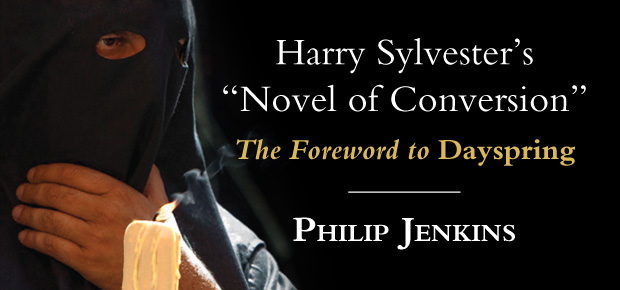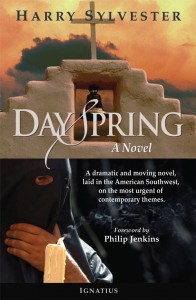
Literary reputations are delicate things. An author who today is touted as the next Faulkner or Dickens can be completely forgotten in only a few years, while others rise from utter obscurity. Harry Sylvester, unfortunately, followed the first of these trajectories. He was hugely popular in the 1940s, when knowledgeable critics compared him to other great Catholic writers of the era, to Thomas Merton, J. F. Powers, and Dorothy Day. Today, though, he is all but forgotten, and until recently even his best-known works were hard to find.
That eclipse is a tragedy. Not only was Harry Sylvester a powerful novelist in his own right, but Dayspring belongs in the very select list of American spiritual classics, of its great Christian novels. If the book had been written in Europe–if the book you have before you had been translated from French, say, or from Russian or Danish–then we would now regard it as a cherished religious text, a mainstay of college literature courses. We would know it as the kind of book that changes lives. Any literate person would be ashamed not to have read it. As it is, the book suffered from being just too accessible, and then it vanished without trace. Ignatius Press deserves our highest thanks for bringing it back to a general readership.
Born in 1908, Harry Sylvester seemed destined to be known as one of America’s great Catholic writers. After graduating from Notre Dame (where he played football for Knute Rockne), he enjoyed a solid reputation as a prolific journalist and short-story writer. As he wrote so much about boxing, sports, hunting, and bullfighting, it was natural to call him the “Catholic Hemingway”. By the 1940S, Sylvester was one of the most frequent contributors to magazines like Collier’s and Scribner’s, and he also wrote for America and Commonweal. At the end of the 1940S, though, an “intellectual dis-conversion” pushed Sylvester away from the Church, and that transformation cut him off from his natural readership. He effectively dropped off the Catholic map, and none of his later writings had anything like the same appeal for a mainstream secular audience. By the time of his death in 1993, he was largely forgotten in the literary world.
 Forgotten writers often deserve their oblivion. Either they were not all that good in the first place, or their work made sense only in the context of a particular era. Neither applies to Harry Sylvester, and especially to his three finest novels, Dearly Beloved (1942), Dayspring (1945), and Moon Gaffney (1947). In the mid-1940s, a generation ahead of their time, his novels were already exploring such enduring themes as Catholic social activism, corruption and secrecy within the Church hierarchy, and Church involvement in civil rights and racial reconciliation. Dearly Beloved denounced the Church’s failure to confront segregation and racial discrimination. Moon Gaffney, meanwhile, presented a daring and sometimes anticlerical portrait of New York Irish-American life, exploring the cynical involvement of some clergy in political and financial wrongdoing. Neither book makes any boast of calm objectivity, and we could easily dispute their historical accuracy, yet both remain eminently worth reading, and not just for the rich and unexpected picture they offer of mid-century Catholic attitudes. Each in its way represents the agonized response of a devout Christian to the compromises that a powerful institution makes to live in the world. The questions Sylvester raises are timeless.
Forgotten writers often deserve their oblivion. Either they were not all that good in the first place, or their work made sense only in the context of a particular era. Neither applies to Harry Sylvester, and especially to his three finest novels, Dearly Beloved (1942), Dayspring (1945), and Moon Gaffney (1947). In the mid-1940s, a generation ahead of their time, his novels were already exploring such enduring themes as Catholic social activism, corruption and secrecy within the Church hierarchy, and Church involvement in civil rights and racial reconciliation. Dearly Beloved denounced the Church’s failure to confront segregation and racial discrimination. Moon Gaffney, meanwhile, presented a daring and sometimes anticlerical portrait of New York Irish-American life, exploring the cynical involvement of some clergy in political and financial wrongdoing. Neither book makes any boast of calm objectivity, and we could easily dispute their historical accuracy, yet both remain eminently worth reading, and not just for the rich and unexpected picture they offer of mid-century Catholic attitudes. Each in its way represents the agonized response of a devout Christian to the compromises that a powerful institution makes to live in the world. The questions Sylvester raises are timeless.
Dayspring, though, is timeless in another sense, in that it deals with an ordinary man suddenly and shockingly exposed to eternal realities far beyond his experience or comprehension. Spencer Bain, who is wholly a man of his time, must confront the primal spiritual facts, of sin and damnation, redemption and revelation, and this encounter forces him to re-evaluate everything he thinks he knows about his life and the world around him. Dayspring is above all a novel of conversion, of how the rising sun of faith begins to “enlighten those who sit in darkness and in the shadow of death”. And although the transforming spirituality Bain comes to know is passionately Catholic and Christian, it is a Catholicism utterly different from what he has come to expect in the sophisticated technological society of twentieth century America.
Like many artists of the time, Harry Sylvester spent lengthy periods in New Mexico, which had become wildly fashionable because of the primitivist vogue for Native American cultures. In the late 1930s, moreover, Anglo visitors turned their attention to the Penitentes, who used different forms of self-torment to subdue their sinful bodies. But while many Americans saw in Hispanic religion merely another tourist attraction, Sylvester found here an intoxicating and radically different version of Catholic Christianity, and one apparently free of the clericalism, bureaucracy, and compromise he so detested. This culture forms the backdrop for Dayspring.
Sylvester’s profound admiration for southwestern religious culture goes far to explaining the novel’s poor reception among critics, who could not believe they were seriously expected to admire the ridiculous savagery of the Penitentes. In the New York Times, literary oracle Orville Prescott reacted coldly to what he described as “only a religious tract spiced with plenty of sex”, while to his eyes, the Penitentes were “not masochistic; only barbarously fanatic”. No reviewer found time to admire Sylvester’s superb descriptions of mystical experience or the visionary encounters that transform the puzzled Bain, trampling all his previous experience and expectations.
Nor could the critics understand how the absolute religious vision of the Penitentes–their medieval obsession with sin and salvation–might have the slightest relevance to Bain’s own Anglo community, which was so firmly rooted in the secular modern world. Initially, Bain himself is a dispassionate observer of the Hispanic world, and only gradually does he come to see through their eyes. When he does, though, he is appalled by the ways and customs of his own people, especially among the sexually liberated progressive colony centered on the horrendous Marsha Senton. (The colony is a barely disguised version of Taos, and Marsha is just as clearly meant to be Mabel Dodge Luhan.) Bain comes to realize that his own Anglo people are at least as deeply imbued in sin as the “primitive” Hispanics, at least as pagan and bloodthirsty, although they lack any awareness of the need to change. Who are the real barbarians, he asks? Who are the true fanatics? Adding a powerful contemporary theme to the novel, his wife’s plans for a second abortion serve to focus Bain’s growing awareness of sin and personal responsibility.
Dayspring is a thoroughly modern book in the questions it asks about the nature of Catholic Christianity and the tremendous spiritual appeal of the forms of faith found outside the European mainstream. Sylvester was after all writing during the 1940s, at a time when other Westerners were seeking enlightenment in the religious mysticism of India, Japan, or Tibet. In contrast, he was among the few who grasped the power of Hispanic Christian spirituality and the astonishing depth of the Christian mystical tradition. Sylvester’s openness to hearing those other voices is all the more relevant at a time when Catholic numbers are growing so rapidly in the global South, and when churches across the United States are being transformed by the Latino presence. Christians worldwide are again exploring the power of charismatic faith and visionary experience.
Perhaps Americans forgot Dayspring because the book’s vision meshed so poorly with the religious commonplaces of the 1950s. In the early twenty-first century, though, it seems more relevant than ever.
Philip Jenkins
Professor of Humanities
Pennsylvania State University
March 2009






Leave a Reply